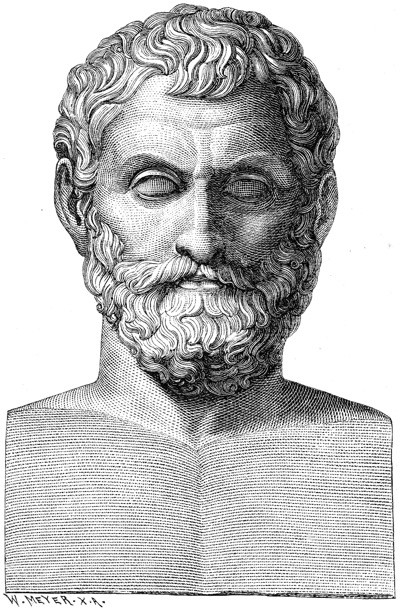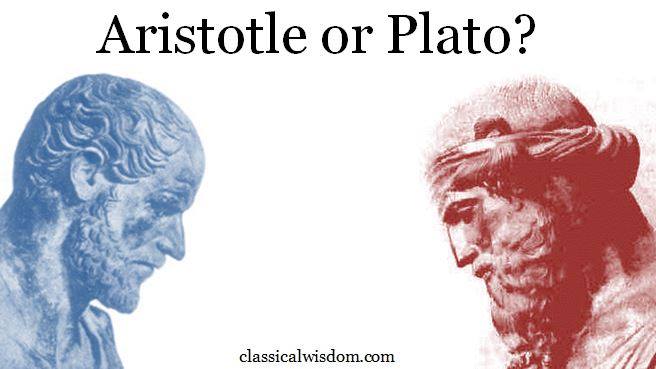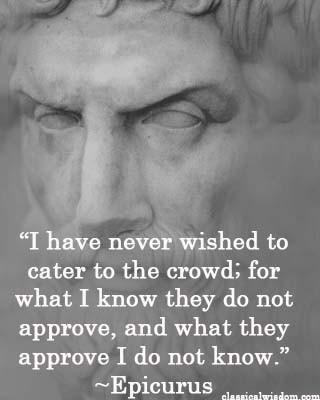1. Metaphysics
Metaphysics is the very broad and very profound branch of ancient philosophy that attempts to makes sense of

the universe around us. Metaphysics asks ‘what is the universe?’ What is it made of? How does it behave? And what about the universe makes toast always land butter side down? This was a subject that was very popular with the early Greek philosophers, who are also known as the pre-Socratic philosophers.
It was kicked off by Thales of Miletus who made the bold claim that the entire world was made of water in one form or the other. Other early philosophers such as Heraclitus, Parmenides, and Pythagoras all took a swing at metaphysics and all came up with different answers.
We could go into detail about each of their theory’s about the nature of the universe. It would all be very informative, profound and enlightening. However, instead I am going to tell you some shortcuts that you can use to surprise your friends and impress pretty people you might me on the town tonight.
How and when to use metaphysics…
The next time you are out taking in the night air, make an off handed comment about how beautiful the night sky is. You companions will look up and concur with you. Perhaps somebody will pose a question about the beauty of the universe and what it all means. This is where you spring into action.
Explain that you believe that the universe is commanded by a divine reason and that, from your perspective, the only thing that that remains consistent is the fact that everything is always changing. After all, you can never step in the same river twice! (Heraclitus)
Point out that the universe appears to be governed by mathematical principles. Isn’t it interesting how our universe can be aptly explained by complex mathematical formulas that have been developed in the fields of calculus and physics? (Pythagoras)
Assert that the universe is unchanging. After all, the laws of conservation of matter and energy have shown that substances can not go out of being. The universe has always existed in a state that is incapable of fundamental change. (Parmenides)
2. Epistemology

Epistemology is the study of knowledge and the best way to attain true knowledge. It is a pursuit of knowledge about knowledge that ultimately gives you more questions than answers. Epistemology can be a bummer because the more you explore, the more you learn that you actually don’t know anything. Almost every philosopher in the history of philosophy has had some sort of opinion on epistemology.
However for our purposes, we will simplify.
When you get right down to it, we learn that there are essentially two types of epistemologists. Empiricists believe that true knowledge comes from experience and from the information that we gather through our senses. Rationalists says that we can only gain true knowledge through rational thought.
The two superstars of epistemology of ancient Greece were Plato (a rationalist) and Aristotle (an empiricist). These two camps have been expanded upon over the years and almost every philosopher after Plato and Aristotle have fallen into one of these two categories.
How and when to use epistemology…
The next time you are at a cocktail party and are confronted with a question that you obviously have no experience with, best to use a rationalist approach. If your friend asks if you think intelligent life exists somewhere in the universe, drop some rational thinking on them. Explain that, from a purely rational perspective, we know that there are countless stars floating about in an untold number of galaxies. It would be rational therefore to conclude that somewhere there must exist some form of life that has evolved into a conscious being. So yes, now excuse me while I order another Tom Collins.
If a friend of yours was to ask you a profound question like “do you think that that woman over there would ever date me?” Go right ahead and break down your knowledge like a true empiricist. You could explain that your senses tell you that the woman is exceedingly beautiful. Your senses also tell you that your friend is short, fat, balding and lives with his mother. And from your experience, beautiful women don’t usually date your short, fat friend. Feel free to tell your friend “fat chance charlie, and excuse me while I order another Tom Collins”.
3. Ethics
Ethics is the philosophical study of what makes an action either good or bad. This leads to the rather important question of “How should I lead my life?”

Ethics became rather popular not long after the death of Aristotle. While much of the other Greek philosophers had tried their hand at ethics, they are often remembered for other things. The general conclusion, and this was supported by the likes of Aristotle and Socrates, was that humans should spend their lives pursuing the truest form of wisdom, whatever that means.
Zeno of Citium and Epicurus of Samos were two philosophers who came up with two seemingly contradictory theories of ethics during the Hellenistic age of Greece. You are an avid reader of Classical Wisdom Weekly, so I won’t bore you with the specifics.
Essentially, Epicurus says that we should spend our lives purging ourselves of fear and pain and instead should focus on enjoying subtle happiness found through friendship and love of family. This is the basis of what is known as Epicurianism.
Zeno was the founder of Stoicism and wrote that the best life is one that attempts to be one with nature. Stoicism tells us to accept the world and do our best to change our thinking to live content lives. The stoics often denied themselves physical pleasure and pursued a life of virtue, duty and wisdom.
How and when to use ethical philosophy…
Ethical philosophy is good for any question that begins with “Do you think it’s a good idea for us to…”. If you were perhaps confronted with a question like “Do you think it is a good idea for us to go to this party tonight?” You will have to come to some sort of ethical conclusion and determine if going to a party would be a good or bad action.
If you want to follow Epicureanism, you could explain to your friend that we are all going to die eventually. There is no sense worrying about that because it is unavoidable. So yes, let us par take in some sensual pleasures and go to this party so that we can drink, dance and carry on like it’s Freshman year in college. That might be a bit overkill, but you get the idea.
If you want to be a true stoic, then you might take a different position. It might be fun for tonight to go to this party, but that joy would be temporary. You have work tomorrow and being exhausted and hungover will not benefit you in the long run. Best to not go. We should focus on attaining virtue and committing ourselves to our duties. Doesn’t that sound like so much fun?
4. Asking ‘Why?’
Philosophers and children are excellent at doing this. You may have been confronted by your child who 
will ask a question. You will give an answer and they will promptly ask ‘why?’ I have seen this game play out between children and parents and it usually ends with little Johnny being sent to nap time and Mommy popping a few aspirins.
It can be a bit of a headache for those on the receiving end of that infernal ‘why?’ Nobody was better at doing this than Socrates. Socrates would hold public lectures where he would challenge ordinary citizens of Athens to explain concepts that were seemingly obvious yet rather confounding when someone was pressed to explain them.
Socrates might ask a citizen ‘what is beauty?’ Most people would probablly give an example of a beautiful thing, a rose perhaps. However, an example of a beautiful thing is not a concise understanding of Beauty. And so we see that while we may think we know true beauty, we are actually rather clueless.
This is philosophical excercise of question and answer is known as “Socratic dialogue” or “the Socratic method”. The purpose of this is to distinguish between what we know and what we simply believe in. Here we see that philosophy, in fact, is something you learn to do rather than something that you come to know.
Socrates believed that wisdom was the ultimate end for any human. We, as responsible citizens of the world, should make an effort to truly examine our lives and bring to light all our pre conceived notions that fall flat when put under severe scrutiny.
How and when to play the “why” game…
This is a cool party trick and is a pretty good default move if you simply want to appear intelligent. It is very simple as well. Whenever somebody asks you a question, tilt your head to the side, look off into the distance thoughtfully, stroke your chin as if you are deep in thought, and then answer their question with another question.
The purpose of this could be to attempt to attain a truer form of knowledge by examining the root of something. Or you could do this to annoy everybody around you and make them stop asking questions. Your choice really.
If a friend of yours were to confront you with a question like ‘do you love your wife?’ You could simply respond ‘What is love?’ They will undoubtedly think you are weird and wander off to talk to somebody who knows how to hold a conversation.
I would encourage you to remember that wisdom is asking, ‘what is love?’ but intelligence is knowing not to say this if your wife is the one you are speaking to.
5. Knowing Our Limitations
This is the part of the newsletter where I wrap things up and end with a thoughtful remark. Use this advice to fool people into believing that you know your stuff, or actually attempt to pursue knowledge. I would lean toward the latter rather than the former. Socrates was considered wise because he accepted that he knew very little.
By understanding that we don’t know everything, we make ourselves wiser. Go forth my friends! Enjoy your endless pursuit of wisdom, knowledge and philosophical insight. I’ll be doing the same…
 the universe around us. Metaphysics asks ‘what is the universe?’ What is it made of? How does it behave? And what about the universe makes toast always land butter side down? This was a subject that was very popular with the early Greek philosophers, who are also known as the pre-Socratic philosophers.
the universe around us. Metaphysics asks ‘what is the universe?’ What is it made of? How does it behave? And what about the universe makes toast always land butter side down? This was a subject that was very popular with the early Greek philosophers, who are also known as the pre-Socratic philosophers.
 Ethics became rather popular not long after the death of Aristotle. While much of the other Greek philosophers had tried their hand at ethics, they are often remembered for other things. The general conclusion, and this was supported by the likes of Aristotle and Socrates, was that humans should spend their lives pursuing the truest form of wisdom, whatever that means.
Ethics became rather popular not long after the death of Aristotle. While much of the other Greek philosophers had tried their hand at ethics, they are often remembered for other things. The general conclusion, and this was supported by the likes of Aristotle and Socrates, was that humans should spend their lives pursuing the truest form of wisdom, whatever that means.









One comment
Hallo there, Anya!
This is an application of the Crash Course…
An Incomplete Philosophy of a Snake
The snake is a predator, a hunter that’s searching for a meal, a prey…
Almost nothing else matters…
A snake doesn’t want something that’s too difficult to catch;
he wants high returns, in terms of energy, for as little effort as possible…
He simply wants to grow stronger!
He wants to conserve his energy and he wants more energy than what he spents in the attempt to catch a meal…
A snake is shrewd in his actions and fast in the strike…
A snake is not stupid, and anyone who is worthy of being called one is not to be underestimated…because such a one will understand efficient life…
He’ll avoid needless strife—
He’ll actually appears to live a rather peaceful life — for the most part!
They’re dangerous and not easily understood…
Anybody near them can be in serious peril…and should stay out of their way…
One is safe from their wrath for as long as one doesn’t appear to be a threat, to them.
However, they’re strategic in their thought, and won’t strike at random;
they’ll not strike at anyone or a anything…
They’re specific in what they want and need;
they want to survive and gain…
They don’t care about anything else!
They are betrayed for what they are only by that look in their eyes!
Beware and watch your step!
Explanation
– – – – – – – – – – –
Metaphysics: A snake just want to live an efficient life and isn’t a threat to anybody or anything except to a threat or a prey…
Epistemology: One mustn’t act as a threat or a prey towards a snake if one wants to be safe…
Ethics: The ethics of a snake is basic and a human who is seen as a snake will actually be dangerous if he is really such a person…
Pieter J (PJ)
Edited
Trackbacks
Our apologies, you must be logged in to post a comment.